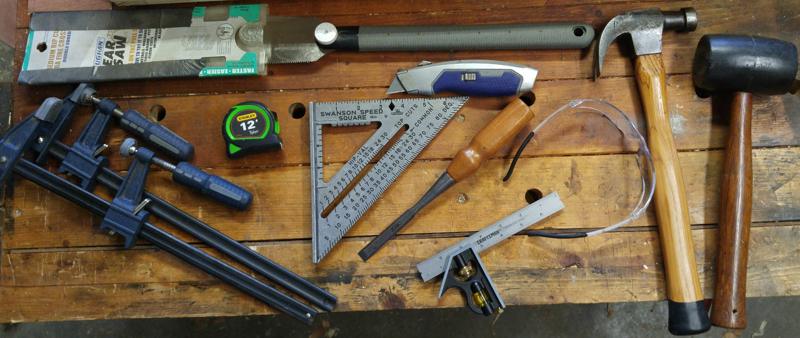My son and I were recently talking about what tools I would replace immediately if my shop got wiped out by hurricane or sink hole. I have a lot of old tools. Many of them are not essential, but I keep them because the have family history (my Dad’s, my Grandfather’s, my Great uncle’s). If they disappeared, I would be sad, but would not go out of my way to replace them. We were talking about essential tools. So I had some thoughts on it already in place when a friend expressed an interest in getting started in woodworking and wanted to know what to start with.
Here is my list of starter woodworking tools (along with affiliate links to Amazon):
- Ryoba Saw – Inexpensive, no maintenance, can handle crosscuts and rips. These Japanese style saws are easy to use and usually make nice clean cuts. Mine is made by Vaughan but there are many available for under $30.
- Sliding Utility Knife – Useful for marking cuts (a marking knife) to create a knife wall for clean, accurate saw cuts and so many other cutting tasks. Look for a smooth action and easy blade changes. Avoid the folding variety.
- 12′ Tape Measure – This length is smaller and easier to keep at hand. Go 25′ if you plan to build BIG stuff, but otherwise 12′ or 16′ is good length. Favor a good positive lock and easy to read markings over looks.
- Swanson Speed Square – Handy, easy to use for marking square cuts, measuring angles, and scribing lines. And yes, brand matters. It is made in the USA and has features that no other square has. The Swanson plastic ones are good too, but if using a knife to mark your cut lines, it is easy to accidentally shave off plastic and make it no longer accurate.
- Combination Square (either 6″ or 12″) – Useful for all kinds of measurements and marking. Starrett is the top of the line (and priced as such). Mine are all Craftsman (which are made by Empire) and are all good and made in the USA. Look for etched lines and numbers on the ruler and avoid plastic.
- F-clamps 12″ – 16″ – In woodworking you can never have too many clamps, buy at least two clamps in this size can get you started. Buy more as needed to suit your builds. I have a mix of Bessey, Jorgensen, and Harbor Freight. Jorgensen was the last of the US made variety, but have moved to over seas, since then I buy the Harbor Freight version. Look for the clutch plates to slide the heads, rather than the free floating version.
- 1/2″ Chisel (12mm) – You can spend a fortune on a complete set of chisels in every width, but most will go unused. Start with a 1/2″ get it good and sharp. It will cover 90% of your chisel needs. Full sets just mean more sharpening and less time building. Mine is a vintage Stanley, but I also have a Stanley Fat Max that I have put through a lot of work and it works well. Look for one with a comfortable handle. The Stanley Fat Max has the bonus of having a metal end cap so you can use a hammer on it rather than a mallet if you need to. Avoid Butt chisels, which just means they have shorter handles unless you know you will be doing a lot of close quarter work.
- Good Eye Protection – Safety first. Use them. Favor comfort. If they are comfortable, you are more likely to use them. If you have trouble seeing close-up, go for the bi-focal versions.
- 16oz Claw Hammer – I favor Estwing or Vaughan as they are quality, and still made in the USA. Look for a smooth face for less marring of the wood.
- 16oz Rubber Mallet – Favor a white rubber or non-marring head. Deadblow or not is up to personal preference. Deadblow is nice for pounding together wood joints, but if doing mainly chiseling or carving, they waste a lot of energy.
- Cordless Drill / Driver – Holes are very important in woodworking. Mine is a Makita, but Bosch, Ridgid, or Dewalt should do fine too. There are not a ton of features to separate one brand from the other. If you plan on wanting additional cordless tools, I suggest researching those tools specifically, and when you pick the winner, just chose the drill/driver from that company that will use the same batteries. Ridgid has a lifetime warranty, even covering batteries. DeWalt has some that are made in the USA.
This should be enough to give anyone a start with the basics and then they can branch out to other more specialized tools from there. Highly recommended first build: The Bulloxon Vise
